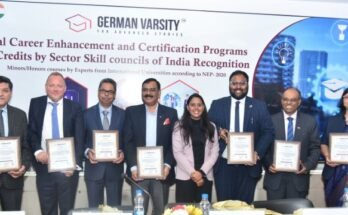Dhaka (Bangladesh) : The Bangladesh prime minister inaugurated the Dhaka Summit on Skills, Employability, and Decent Work at Osmani Memorial auditorium in the capital.
Prime Minister Sheikh Hasina urged both local and international entrepreneurs to take steps to ensure labour rights along with creating more employment opportunities. She also urged them to take steps for development of environment in their respective industries, ensure increased welfare of their workers, their occupational health and safety, and employ more women and physically-challenged people.
She hoped that development partners will increase their co-operation in improving the efficiency of workers, improving reliability and creating decent work environment as they did in the past.
Mentioning that achieving Sustainable Development Goals (SDGs) is a big challenge for Bangladesh, the prime minister said increasing the supply of skilled manpower, creating new employment and income earnings capacity will help us alleviate poverty and other social indices to the desired level.
About export, Hasina said, “We should diversify our products and expansion of market for our future economy and jobs.”
Referring to incentives to increase the demand for products, she said, “Only incentives are not enough, we also need to invest more in capital and technology and human resource development.”
Putting emphasis on the value addition of products, she said, “If we improve our garment products’ design and market those by ourselves with self-initiative, we’ll be able add more value.”
She said labour intensive industrial sector is vital for creating employment opportunities and making the production of goods and services competitive through reducing their cost skill development of manpower is a must.
“At the same time, both demand and wages of intending migrant workers could be increased through enhancing their skill,” she added.
The prime minister said there is no alternative to training in order to develop skilled manpower, and her government had formulated National Skill Development Policy 2011 through coordination of all types of vocational and technical educations run by the government, private and NGOs.
Besides, the government has been implementing various programs aimed at improving education and skills such as technical and vocational education and training system reform, action-tailored and internationally recognized training system and new workplace skill development training.
Hasina said technical and financial assistance from ILO and other development partners are playing a significant role to implement the government’s long-term technical and vocational education and training reform program.
Hasina said the national capacity will have to be achieved by skilled labor force as well as through developing skilled managers and skilled professionals.
The university-level education system must be conducted as per the need of industry and universities will have to start making skilled managers with proper education and training systems, she added.
Note: News shared for public awareness with reference from the information provided at online news portals.


